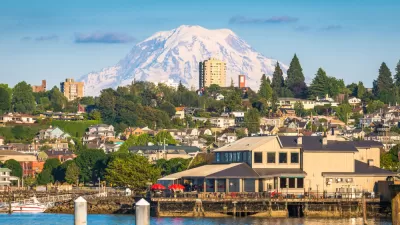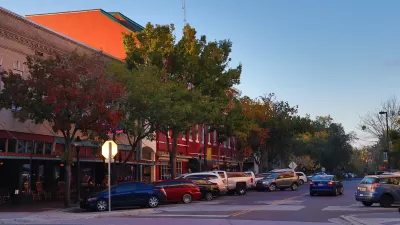Berkeley, California, pioneered exclusionary zoning in the early 1900s; with its new upzoning proposal, the city hopes to reverse that negative legacy and boost its housing supply by eliminating single-family zoning.

In 1916, Berkeley, California, became the first city to pass a single-family zoning law. But now, nearly a century later, the city is poised to reverse that historic — and consequential — decision, “joining other cities around the country overturning the regulations in a growing push to combat shortages and spur multifamily development,” according to a CoStar article by David Holtzman. The city council voted back in 2021 to begin the process of updating the city code to eliminate most of the city’s single-family zoning district and ”was on the cusp of approving plans last month … until a vote on the measure was delayed due to a procedural matter. But local officials expect the council to pass [the plan] in October,” the article reads. Under the new ordinance, 10 houses will be allowed per acre in the former single-family zoning district, while density in other zoning districts is expected to change to allow 20 houses per acre.
Single-family zoning refers to zoning policy that restricts development in an area to single family homes. Originally touted as a way to preserve home values and maintain public health and safety, the original measure was proposed by the developer of the Elmwood neighborhood, who wanted to preserve home values in his development by preventing Black families from moving into adjacent areas. Since then, it has a history of being used as a segregationist tool to control the demographics of an area, which — combined with minimum lot sizes — has prevented more affordable homes and multi-unit buildings on small lots, contributing to our current housing affordability crisis.
For more on the history and impacts of single-family zoning, check out our Planopedia article: What Is Single-Family Zoning?
“I’m not proud that Berkeley was the first city in the U.S. to pass single-family zoning,” Berkeley Mayor Jesse Arreguin said at the city council’s meeting last month, the CoStar article reports. “We see the outcomes to this day in racial disparities perpetuated by exclusionary zoning.”
“Berkeley, like other U.S. cities, is dealing with a local housing crunch, and it tweaked local zoning codes last year to allow for the construction of taller multifamily developments near the University of California, Berkeley, campus, potentially adding thousands of units,” Holtzman writes. The elimination of single-family zoning will also help Berkeley meet a state mandate to build 9,000 new homes by 2031.
The article acknowledges that “California technically ended single-family zoning statewide when Gov. Gavin Newsom passed legislation in 2022 that enabled single-family properties to be subdivided to allow up to four new houses on lots where only one was previously permitted. However, the law has resulted in limited new development thus far and has faced legal challenges from local governments.” The proposed plan in Berkeley will allow for even more density than state law requires. Once it is official, Berkeley will join the ranks of governments across the country that have abolished single-family zoning, including cities like Minneapolis, Sacramento, Austin, Charlotte, Portland, and Gainesville; counties like Arlington County, Virginia; and states like California and Vermont.
FULL STORY: First US City To Adopt Single-Family Zoning Set To Overturn It

Alabama: Trump Terminates Settlements for Black Communities Harmed By Raw Sewage
Trump deemed the landmark civil rights agreement “illegal DEI and environmental justice policy.”

Study: Maui’s Plan to Convert Vacation Rentals to Long-Term Housing Could Cause Nearly $1 Billion Economic Loss
The plan would reduce visitor accommodation by 25% resulting in 1,900 jobs lost.

Planetizen Federal Action Tracker
A weekly monitor of how Trump’s orders and actions are impacting planners and planning in America.

Federal Homelessness Agency Places Entire Staff on Leave
The U.S. Interagency Council on Homelessness is the only federal agency dedicated to preventing and ending homelessness.

Restoring Northern India’s Himalayan ‘Water Temples’
Thousands of centuries-old buildings protect the region’s natural springs and serve as community wells and gathering places.

Milwaukee to Double Bike Share Stations
Bublr Bikes, one of the nation’s most successful, will add 500 new e-bikes to its system.
Urban Design for Planners 1: Software Tools
This six-course series explores essential urban design concepts using open source software and equips planners with the tools they need to participate fully in the urban design process.
Planning for Universal Design
Learn the tools for implementing Universal Design in planning regulations.
Caltrans
Smith Gee Studio
Institute for Housing and Urban Development Studies (IHS)
City of Grandview
Harvard GSD Executive Education
Toledo-Lucas County Plan Commissions
Salt Lake City
NYU Wagner Graduate School of Public Service





























